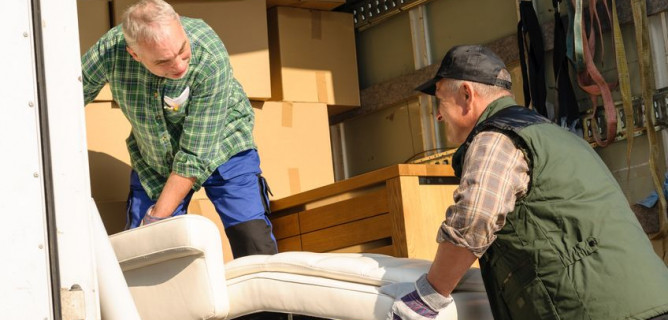 You have just found a new place to settle into and you are probably excited about the new opportunities that await you…but don’t get carried away yet. You have to find a reliable mover, pack all of your belongings and have them delivered to your new home – without a scratch, of course.
You have just found a new place to settle into and you are probably excited about the new opportunities that await you…but don’t get carried away yet. You have to find a reliable mover, pack all of your belongings and have them delivered to your new home – without a scratch, of course.
Along with the legwork, the moving process involves some critical paperwork you will have to deal with. Underestimating the paperwork task can cost you a lot of money. Here is a guide from MyMovingReviews.com to help you understand and stay on top of the paperwork involved in a move.
Non-Binding Estimate
Non-Binding estimates are nothing more than an assumption of what the cost of your move will be, based upon the estimated weight of your items and the additional services requested. The final charges are based upon the actual weight of your shipment and the services provided. Your mover can only demand that you pay 10 percent more than the initial estimation.
Binding Estimate
Binding estimates guarantee the total cost of the move based upon the weight of your items and services noted on the estimate. Ask your movers to arrange an in-home survey and to provide you with a written estimation.
Bill of Lading
Every licensed moving service provider must under federal law provide you with a “Bill of Lading.” This Bill of Lading should annotate the following aspects:
Your mover’s contact and license information: The name, the office address and the phone number of the carrier, and third party carrier (in case your mover is working with a subcontractor) and the US DOT number, the MC number, and any other state license must be noted in the Bill of Lading. Confirm that the MC number on the truck/s is the same as the one on the Bill of Lading.
- Your contact information: Plus, your contact information (or the contact information of the entitled person – in case you are not present on pickup and delivery days) must be noted properly too.
- Origin and destination address of the shipment: Check if addresses are noted properly.
- Agreed date or period of time for pickup and delivery: For a “guaranteed service” – subject to tariff plan, your mover must enter any penalty or per diem requirements upon the agreement. Otherwise only a time frame should be arranged.
- Services’ price rates and form of payment: All the services with respective prices that your mover provides you with have to be included in the Bill of Lading. Professional movers offer packing materials and labor, storage and hoisting solutions along with the moving service. When you contact movers, let them know if there will be any obstacles for the truck to park at your place. Any service that the mover provides for you must be included in the Bill of Lading. Most moving companies offer different ways of payment – cash, money order, certified check, credit and debit cards. Some movers ask for a non-refundable deposit on the moving job – beware if the deposit exceeds 25 percent of the final cost of your move. Do not pay cash – in case of an issue, you won’t be able to evince payment if you have paid cash. The terms and the conditions for payment of the total moving-related charges, including notice of any minimum charges have to be annotated properly.
- Dispute settlement program: If an argument arises between you and your movers, arbitration might be a beneficial option to manage an issue. The BBB and the American Moving and Storage Association often appear as arbitrators. Licensed moving companies provide their customers with a summary of the arbitration process. Know that these dispute settlement programs are not free, and besides the third-party arbitrators cannot take certain lawful measures against your mover.
- Valuation Addendum: Licensed moving service providers have to provide you Full Value and Released Value Protection to choose from. Under the Full Value, your mover will be responsible to repair, or replace the damaged/broken item(s), or to make cash settlement for the cost of repair of the damaged or lost items while being in carrier’s custody. The Released Value option is offered at no additional charge, but the carrier won’t be liable for more than $0.60 per pound per item. It is important to understand that these two levels of liability do not serve as an insurance contract that is regulated by the State insurance laws. They are nothing more than a contractual tariff level of liability. Plus, there are some circumstances that may limit the liability of your mover. Your moving service provider won’t be liable for any item you pack on your own. Furthermore, your mover won’t transport items such as jewelry, china, fine arts or any such items of extraordinary value – value exceeds $100 per pound unless an agreement is set. Your household mover won’t be liable for Items of great value that are not declared in the inventory list.
- Inventory list: Make sure that the condition of all your items is noted properly in your movers’ inventory. Otherwise, on a delivery, if it turns out that an item has been damaged while in carrier’s custody, you cannot prove it was carrier fault.
You shouldn’t sign your Bill of Lading and any of its attachments if you don’t understand every clause thoroughly. And under any circumstances, do not sign blank pages. If an argument arises on the moving day, do not hesitate to call the Federal Motor Carrier Administration hotline at 888-368-7238 (available Monday through Friday from 9:00 a.m. to 7:00 p.m. Eastern Time). Do not get scammed by rogue movers; make smart decisions.
Source: http://www.MyMovingReviews.com
Courtland Building Company would love to help you plan your green home, call us today: (281) 932-4494
Visit our website: www.courtlandbuildingcompany.com Follow Us on Facebook – Twitter – LinkedIn– Google Plus


